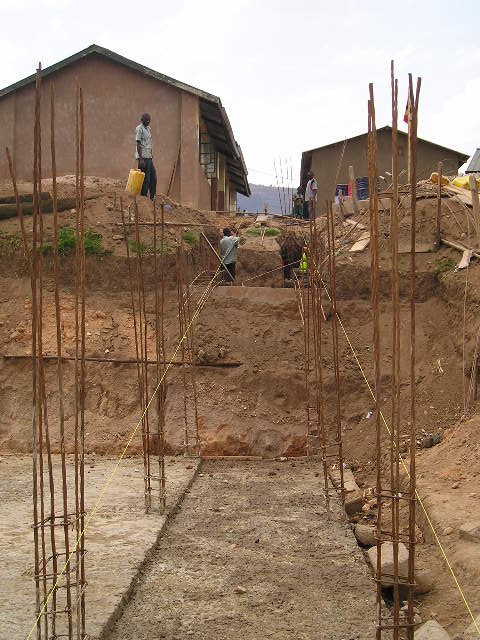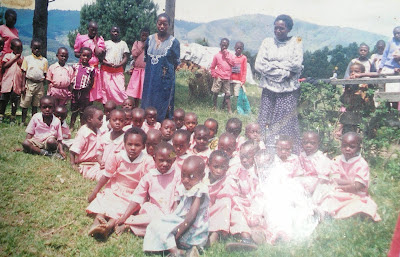Dear Friends
Steve Voehl and I left on January 25th for our long spoken trip to Africa. The 24 hour trip took us from Medford to St Francisco, Chicago – Brussels and lastly to Uganda landing at Entebbe International airport. Upon arrival on January 26th we found Fr Julius Kabatereine from the same order with me waiting to pick us up for a one hour drive to the Apostles of Jesus Regional house where we received two nights accommodation before proceeding to south western Uganda.
The night we arrived, things changed and we soon realized that we were no longer in America. We had an electricity blackout just as we were being accompanied to our rooms. Darkness that befell our eyes confined us to our rooms anxious to reduce the two days’ flight lag by taking a cool shower. But not until then were we told that there was no water for about two days. It was really frustrating for it was very hot and temperatures were highly unpleasant. Two days later we left for Rubanda.
Tired and speechless, after eight hours long drive, crazy driving, and potholes, we finally arrived at Rubanda Solidarity Community School, the heart of our trip. Here, things were different. We were welcomed by cheerful and smiling faces of the school children that completely absorbed all the tiredness and fatigue we had accumulated as we traditionally hugged each other accompanied by a warm bath and delicious dinner.
To my amazement, it didn’t take long before Steve started familiarizing with the place, culture, and food which I was worried, for any person in a new place and culture. He adjusted so fast and started identifying the foods of his preference, like deep fried Lake Victoria Nile patch fish. It was one of our favorite dishes along with Ugandan baked pizza. While enjoying the fish I recall overhearing Steve saying,” there is very little difference in foods with America except limited variety and the preparations.” I admired his humility knowing where he comes from and how much he had to sacrifice to live as if he had nothing.
Sunday the 29th, became one of the most fascinating days when we went to church. While I was excited to be home and pray in my own mother tongue and with the whole body, it was different for Steve. I could see him trying to cope with all the African gestures with no word on his lips until I had to look to find an English missal for him. It was humbling for him and I recalled how I first felt the first time I came out of the sacristy at St Anne to celebrate my first Mass. I looked left and right and could not see any one like me and I said to myself, “Wow, is it only today?” I felt the same for Steve.
At the closing of the Mass, Steve was introduced and invited to greet the community. It was the first time I ever saw Steve lost for words out of joy. I admired his courage and humility when he came forward to greet the congregation in the shortest words possible that left everyone smiling with mouths wide open for more.
Time was not our friend; days were running fast as we had a big agenda to accomplish. My priority agenda was to be with my family, my school children and staff, meeting friends and relatives, and take Steve around the community. On the other hand, we had projects to realize: improve my mum’s chicken house, teach gardening, construct school children’s toilets and bathrooms, renovate our school front fence and fix a new gate to improve child security. We also had to strengthen different community development groups like the revolving fund association, community solar light project, meet the community to find a lasting solution for water scarcity, initiate a “Yamba Abaana Rubanda Solidarity” that is an association responsible for child sponsorship, continue to strengthen the school drop out youth activities, and continue to consolidate land for future developments.
Our daily activities saw Steve focusing on gardening as his most conversant area of need and the son of the soil left swimming in the sea of the whole mission-the community.
We are very happy that most of our planned activities were realized though we failed to see the completion of everything due to limited time. The chicken house renovation was delayed due to the disclosed plan for my parents to relocate their residence to a nearby place that is more accessible to the road as they advance in age. We had delicious meals with my family and recall the beautiful get-together sharing everything with Steve like a member of the family. On the other hand, the garden plan was slightly affected by the neighboring mobile chickens and hazardous soil insects. Chickens are the main source of family conflicts with neighbors in my community. Zero grazing would be the best but how many can afford it? Actually I recall Steve, frustrated by these chickens exclaiming, “Let us go and catch all of them for a slaughter. That would be the first failure in good neighborliness,” I replied.
We were able to accomplish more than our time. We constructed twelve stance toilets and same number of bathrooms separating them by gender, sensitivity requirements (urinal & incinerator). This project has been exciting and interesting. It brought together and involved many community members and provided employment to many poor youth. It was also the first school in the whole district to have this kind of project to invest in improving sanitation for better health and quality education according to the district’s health inspector of school. For more information and enrichment please contact me to see our –trip- and our work done in a photo album.
Our community and our projects have many needs that need prioritizing. Once the current projects are closed our immediate priorities are to continue to build up our sponsorship base, consolidate more land, construct a nursery school section at a separate location as required by the government provide better services to children, quality education, and strengthen the existing income generating skills for school drop out youth and mothers.
Last, but most importantly, all this has been possible because of the generous hearts of many people from the local community, Grants Pass and Europe, who donated for our trip and mission. There is never nothing too little to the poor. Each contribution adds greatly to creating a difference. It’s indeed already visible as the community members witness the sign of your love and with Steve Voehl representing each of you in our community. It was an honor.
May God continue to regenerate his love within each one of us so as to be more visible in our world today.
Have a Wonderful EASTER of the Risen Lord.























































